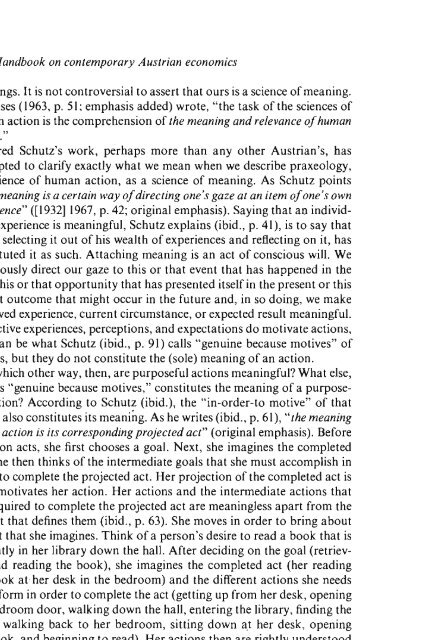Handbook on Contemporary Austrian Economics
Handbook on Contemporary Austrian Economics
Handbook on Contemporary Austrian Economics
Create successful ePaper yourself
Turn your PDF publications into a flip-book with our unique Google optimized e-Paper software.
32 <str<strong>on</strong>g>Handbook</str<strong>on</strong>g> <strong>on</strong> c<strong>on</strong>temporary <strong>Austrian</strong> ec<strong>on</strong>omics<br />
meanings. It is not c<strong>on</strong>troversial to assert that ours is a science of meaning.<br />
As Mises (1963, p. 51 ; emphasis added) wrote, "the task of the sciences of<br />
human acti<strong>on</strong> is the comprehensi<strong>on</strong> of the meaning and relevance of human<br />
acti<strong>on</strong>."<br />
Alfred Schutz's work, perhaps more than any other <strong>Austrian</strong>'s, has<br />
attempted to clarify exactly what we mean when we describe praxeology,<br />
the science of human acti<strong>on</strong>, as a science of meaning. As Schutz points<br />
out, "meaning is a certain way of directing <strong>on</strong>e's gaze at an item of <strong>on</strong>e's own<br />
experience" ([1932] 1967, p. 42; original emphasis). Saying that an individual's<br />
experience is meaningful, Schutz explains (ibid., p. 41), is to say that<br />
he, by selecting it out of his wealth of experiences and reflecting <strong>on</strong> it, has<br />
c<strong>on</strong>stituted it as such. Attaching meaning is an act of c<strong>on</strong>scious will. We<br />
c<strong>on</strong>sciously direct our gaze to this or that event that has happened in the<br />
past, this or that opportunity that has presented itself in the present or this<br />
or that outcome that might occur in the future and, in so doing, we make<br />
that lived experience, current circumstance, or expected result meaningful.<br />
Subjective experiences, percepti<strong>on</strong>s, and expectati<strong>on</strong>s do motivate acti<strong>on</strong>s,<br />
they can be what Schutz (ibid., p. 91) calls "genuine because motives" of<br />
acti<strong>on</strong>s, but they do not c<strong>on</strong>stitute the (sole) meaning of an acti<strong>on</strong>.<br />
In which other way, then, are purposeful acti<strong>on</strong>s meaningful What else,<br />
besides "genuine because motives," c<strong>on</strong>stitutes the meaning of a purposeful<br />
acti<strong>on</strong> According to Schutz (ibid.), the "in-order-to motive" of that<br />
acti<strong>on</strong> also c<strong>on</strong>stitutes its meaning. As he writes (ibid., p. 61), " the meaning<br />
of any acti<strong>on</strong> is its corresp<strong>on</strong>ding projected act" (original emphasis). Before<br />
a pers<strong>on</strong> acts, she first chooses a goal. Next, she imagines the completed<br />
act. She then thinks of the intermediate goals that she must accomplish in<br />
order to complete the projected act. Her projecti<strong>on</strong> of the completed act is<br />
what motivates her acti<strong>on</strong>. Her acti<strong>on</strong>s and the intermediate acti<strong>on</strong>s that<br />
are required to complete the projected act are meaningless apart from the<br />
project that defines them (ibid., p. 63). She moves in order to bring about<br />
the act that she imagines. Think of a pers<strong>on</strong>'s desire to read a book that is<br />
currently in her library down the hall. After deciding <strong>on</strong> the goal (retrieving<br />
and reading the book), she imagines the completed act (her reading<br />
the book at her desk in the bedroom) and the different acti<strong>on</strong>s she needs<br />
to perform in order to complete the act (getting up from her desk, opening<br />
the bedroom door, walking down the hall, entering the library, finding the<br />
book, walking back to her bedroom, sitting down ~t her desk, opening<br />
the book, and beginning to read). Her acti<strong>on</strong>s then are rightly understood<br />
as acti<strong>on</strong>s undertaken in order to complete the project (retrieving and<br />
reading the book at her desk). Her end goal, her in-order-to motive, is<br />
what c<strong>on</strong>stitutes the meaning of her acti<strong>on</strong>s.<br />
According to Schutz (ibid., p. 31), "the scientific method of establishing

















